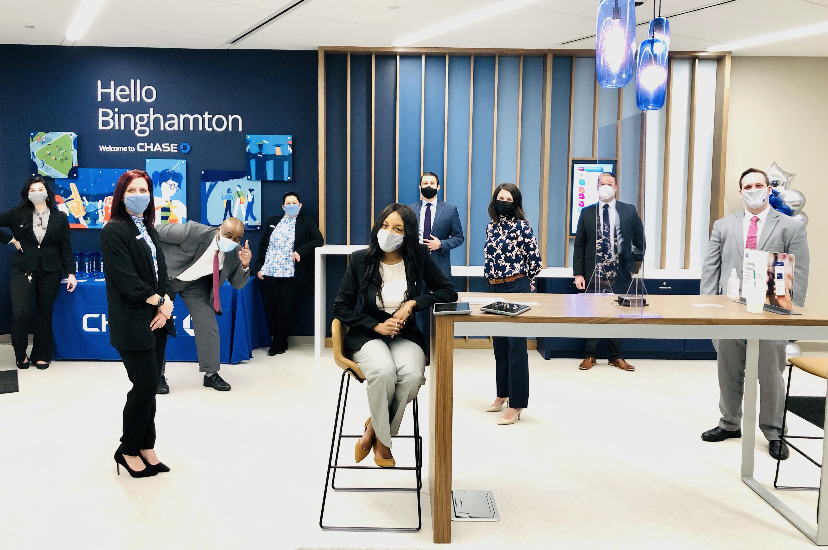A new banking option has opened up for Binghamton University students and town residents as the first JPMorgan Chase Bank opened its doors in the New York Southern Tier region on Feb. 16.
This marked the first time a Chase Bank opened in the Binghamton area since 1984, when the company merged with the Rochester-based Lincoln 1st Bank. The new bank aims to challenge the orthodox design of a financial institution with a more casual approach by having meeting pods, a living room and a digital banking access bar.
Plans to open a Chase Bank branch in the Greater Binghamton area were in the works for a long time, according to Kayla Rother, branch manager of the Vestal location. While Chase Bank has maintained a presence in the region through digital financing and a subsidiary investment office, Rother believes that building a physical location was the next logical step to expand business and have a more active role with its Broome County residents.
“We’ve been serving more than 25,000 customers in Broome County through our credit card, auto finance and other businesses digitally, and now seemed like the perfect time to increase our physical presence in the region,” Rother wrote in an email. “75 percent of our deposit growth comes from customers who use branches and 60 percent is from clients who use both branches and digital. We find that customers prefer high-touch advice during key life moments, like saving for retirement or buying a house. In fact, two-thirds of customers come into our branches, on average, four times a quarter.”
The new Chase branch has to compete in a market of other, well-established financial institutions in the region, including Visions Federal Credit Union, KeyBank and M&T Bank. Rother aims to appeal to the student population with its student-focused location next to U Club Binghamton, casual banking design and regular financial workshops for students and local residents to teach budgeting and saving, future homeownership and general financial wellness.
Rother said what makes Chase different from their competitors is the driven nature of her staff, the connections they have and their plan to build in the Binghamton community.
“We view our expansion into the Southern Tier as a marathon, not a sprint,” Rother wrote. “Our Chase team members are on the front lines when it comes to supporting our customers. Their dedication is truly what makes us unique. We view growth through a holistic lens. Of course, we are looking to grow our customer base, but we also see growth in the relationships we can build within the communities where we operate. It’s our people that set us apart.”
JPMorgan Chase has been a supporter and partner with regional organizations, such as the Broome County Council of Churches, the United Way of Broome County and the Southern Tier AIDS Program. Concurring with Rother, Chase Regional Director Monica Nation views community service and corporate social responsibility as one of their priorities with the new location.
“When Chase enters a community, we bring the full force of the firm,” Nation said in a statement. “In addition to going above and beyond to serve our customers, we are going to be engaged in the community and collaborating with our neighbors to create an even brighter future here in the Southern Tier.”
William Hofving, a sophomore majoring in accounting, who plans to live in U Club Binghamton next year, believes the location of the bank is a positive for the University Plaza community.
“I think that would be a big help for myself and many others who plan on living at [U Club Binghamton] next year,” Hofving said. “Having a bank that close would be convenient if I needed to take money out from my account or just to go in for any other financial needs.”
Eli Meltzer, a sophomore majoring in economics, supports the new Chase branch’s financial workshops and believes it should continue to play an active role in teaching students about financial literacy.
“I think getting students up to speed in financial literacy is a fantastic idea,” Meltzer wrote in an email. “Too many people today don’t have any idea how the financial system works, and that has only been detrimental. Our culture steers college students toward taking out massive loans without always understanding the consequences or how to make an informed decision about them. I think banks should have a role in educating students about how the financial system operates and how they fit into it, probably in the form of community outreach — maybe free classes provided by the University in partnership with Chase.”



